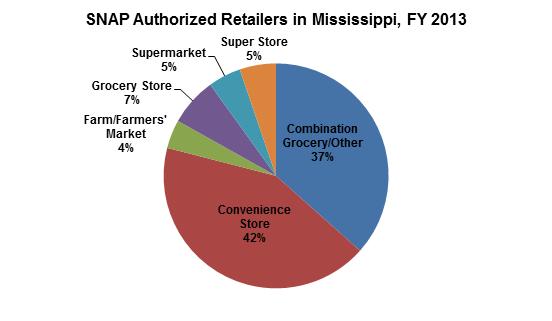This Friday (November 1, 2013), 664,000 people in Mississippi will see their food assistance benefits cut, when a temporary boost to the Supplemental Nutrition Assistance Program (SNAP, formerly known as food stamps) expires. SNAP not only provides nutrition benefits to a wide-range of low-income households, including families with children, elderly people, and people with disabilities, it also provides a significant boost to local economies.
One of SNAP’s many strengths is that it is one of the fastest, most effective ways to stimulate a struggling economy. SNAP brings Federal dollars into communities in the form of benefits, which are used by SNAP participants to purchase food each month at local stores, including local grocery and convenience stores. Every $1 increase in SNAP benefits generates about $1.70 in economic activity. Since benefits can only be used to purchase food, these benefits are spent quickly at local businesses. Benefits help pay those that supply the food, like grocers, farmers and truck drivers, while providing a quick boost to the local economy.
As of June 30, 2013, there were 3,477 retailers authorized to accept SNAP benefits in Mississippi, including 1,475 convenience stores, 103 farms and 40 farmers’ markets, and 241 grocery stores. See Chart. Likewise, in Fiscal Year (FY) 2013, through three quarters over $750 million in SNAP benefits were redeemed at authorized retailers in Mississippi. As a point of comparison, SNAP authorized retailers redeemed approximately $1 billion in benefits in FY 2012.
SNAP is a powerful tool in inserting revenue streams into local economies when times are tough. This revenue supports jobs throughout the state. Consequently, when SNAP benefits are cut, local small businesses are hurt as well.







